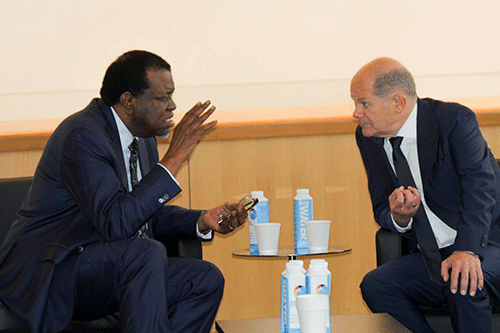Namibia’s ranking as an upper-middle-income country has placed the country in a precarious position, where it is now under pressure to devise new ways to access capital. The country also suggested more sustainable and predictable financing for development.
Speaking at the sustainable development summit high-level dialogue on mobilising finance and investments and the means of implementation for SDG achievement, President Hage Geingob said Namibia is constrained by its status as an upper-middle-income country.
“Namibia continues to be unfairly labelled as an upper middle-income country, limiting access to concessionary capital, without a just recognition of the Gini coefficient inherited from our past,” said Geingob.
The United Nations Population Fund (UNFPA) said 43% of the country’s population is experiencing multidimensional poverty.
According to the UNFPA 2022 annual report, the Gini coefficient index shows that income inequality in Namibia stands at 57.2%.
According to the World Bank Wealth Inequality Index, Namibia ranks second on the top 10 list, only second to South Africa since 2015 as one of the countries with the highest wealth inequality in the world.
The Gini coefficient is a statistical measure of inequality that describes how equal or unequal income or wealth is distributed among the population of a country.
Geingob also suggested more sustainable and predictable financing for development.
“It is critical that progressive dialogues on the issue of debt restructuring and forgiveness, debt for nature and debt for development swaps should remain high on the list of reforms to be prioritised by all. Sustainable and predictable financing is the bedrock for all our development priorities – and only when this is prioritised can we put back on track our collective developmental ambitions,” he said.
He called on international financing institutions, such as the World Bank, to review their capital adequacy ratios, which would unlock more capital for lending to both lower- and middle-income countries.
“The call for the reform of the international financial architecture is a call to broaden opportunities to support development,” said Geingob.
The Head of State noted the country has identified unique opportunities that would address various sustainable development goals, including renewable energy, the cultivation of carbon-sequestrating underwater kelp, sustainable water management and clean synthetic fuels production.
“Through public-private sector collaboration and targeted economic diplomacy, we packaged these opportunities, using innovative financial tools, such as green bonds, sustainability bonds, grants and official development assistance to mobilise more than $1.2 billion in financing commitments by 2023,” said Geingob.
This, he said, was not enough, as the country aims to meet its ambitions of Vision 2030.
“It is critical that progressive dialogues on the issue of debt restructuring and forgiveness, debt for nature and debt for development swaps should remain high on the list of reforms to be prioritised by all,” said Geingob.
He further said sustainable and predictable financing is the bedrock for all development priorities – and only when it is prioritised can collective developmental ambitions be achieved.
“Our efforts to support domestic resource mobilisation have also been central to complementing the efforts of our partners to meet our development needs,” said Geingob.
The Geingob said the country will continue in its endeavours to scale up domestic resources as a means for financing our developmental agenda.
– mamakali@nepc.com.na



